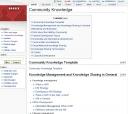Reference materials: http://onlinefacilitation.wikispaces.com/Gender+Equity+and+Women%27s+Rights
DGroups site: http://www.dgroups.org/groups/wsf-genderequity/
Event description
A 2-week online event to discuss what individual and groups were doing to mark the World Social Forum 2008 Global Day of Action and to begin considering how to impact and participate in the WSF 2009 global gathering in Belem do Para, Brasil. Participants from groups concerned about women’s rights and gender equity were asked to join the event. They then subscribed to the main Dgroup and, according to their stated language, either an English, Spanish or French breakout DGroup email list. The agenda was developed collaboratively by Megan, Els, Janet and Nancy. The DGroup was augmented with a Wikispaces wiki to enable quick capture, summarization and machine translation of the group emails.
Note: The survey data reported below represents a small sample due to low completion rates (10 respondents, one of whom is an organizer).
What did we intend to do?
There were 3 overarching goals plus one that emerged during the planning:
1. To find out what groups were doing for WSF 2008
2. To find out interest/plans for WSF 2009 in Belem- what are the common interests where we can collaborate, to what extent can we create a common strategy, how to proceed in Belem? How can we put gender equity on the agenda in the best possible way? How can we influence the agenda, make gender visible, not just in separate sessions?
3. Generally, to reinvigorate the group of people who had been subscribed to the Dgroup. Up until now it had been focused on content and information dissemination. Now the thought is we could revive the community and help shift their perception of the Dgroup – not just a tool for disseminating information, but a community building space. If the community had enough energy and focus, it could be used for planning and participating in WSF 2009
4. From a process standpoint, we also wanted to explore how to have these community conversations and interactions across and between languages, so we also wanted to experiment with tools and process to help with multilingual conversations.
So what did we DO?
Towards our three goals
1. WSF 2008
a. We had reports from 17 groups and one individual on what they were doing both for WSF and in general. Some submitted extensive information, others just brief mentions. The summarized list can be see here: http://onlinefacilitation.wikispaces.com/GEWR+Map
b. In the post event survey 67% found the updates very useful, 33% found them somewhat useful.
2. WSF 2009
a. Initially the main thrust of the 09 conversations was around how difficult it is to find funding to attend. But after the official end of the event, a robust discussion has emerged about building a shared proposal for both impacting the agenda and finding funding for participation.
b. We surfaced some face to face networking opportunities that might not have been apparent. These reinforce our online interactions w/ F2f and offer opportunities to keep momentum going
c. In the post survey, 60% found the discussions on WSF09 useful, 40% somewhat useful.
d. It is those who are most interested in moving something concrete forward who are continuing. Whittled down to a smaller group of posters. Backchannel messages support that point.
e. There still needs to be follow up to turn the conversation into tangible outcomes.
3. Community building
a. 22 people posted personal introductions. The summarized list can be see here: http://onlinefacilitation.wikispaces.com/GEWR+Participant+Bios
b. Did people get to know each other better? We aren’t sure. People shared quite a bit of personal information. This helps bring a personal element beyond organizational stuff, and find out what motivated participants personally
c. Getting a sense about the person beyond the org which can help in networking over time
d. In the post event survey, 80% found the introductions very useful, 20% somewhat useful.
e. Some members very enthusiastically added to the conversation while others dropped in and out. Those who participated less often apologized for being late due to lack of time or internet access, showing the diversity of online habits of the group. This is important to keep in mind for future events. Two weeks is probably not long enough for those who are online less frequently. It is hard for them to keep up with the very active participants.
f. A few members reached out to each other via Skype. Megan noted a Skype conversation with Tran from SPERI.
g. The event revealed potential for ongoing community building.
4. Working across languages and tools
a. We spent quite a bit of energy trying to create a multilingual part of the event. The language sub groups were the most utilized, and few reported using the wiki/Google Translate option (80% did not use it, but the 20% who did found it useful. Nancy found it very useful as facilitator.) 78% felt they had enough opportunity to participate in their own language, and 22% did not, but we don’t have demographic data on the survey respondents to really understand what this means. The respondents may have been primarily English speakers.
b. People responded positively to cross language summaries.
c. What about the break out groups? We don’t know for sure. Due to travel and availability we were not always actively facilitating the groups. The French group was only 2 people – maybe too small to get any traction. Although ten women had signed up for the Spanish group, only two of them posted messages during the breakout. Also, although different Latin Americans reconfirmed their interest, their participation remained limited and in the weeks following the event there was complete silence from their side of the world. Taking into account that many will be going to Belem, it is important to try and find out how we can get them more involved (is it the language problem?). We wonder what would have happened if we did NOT have the breakouts. And we wonder if the breakout process was confusing. In the survey, 50% thought the language break outs were very useful, 50% somewhat useful. But does this reflect the diversity of the group with only 10 respondents?
d. We are not sure who was using the technologies, and for whom it is new technology. The wiki has given us, as organizers, a nice overview, but it appears that not many participants used it. 44% did not look at the wiki, 44% used it and found it useful and 11% found it difficult or confusing to use. The overall wiki page view does show a doubling in traffic during the event. To the right are the page views from the event pages.
e. We only know who is posting, but we don’t know who is “listening” so it is hard to come to too many conclusions about participation, particularly participation across language. It might be nice to follow up with some one on one conversation with some of the participants.
Did anything unexpected happen?
• There was a very wide range in people’s level of participation. We expected that some would only participate a little bit, but less expected the few very strong participants, even when the discussion was not that active
• We were startled by one individual’s energetic participation, particularly since she was new to the group. We wonder who else is out there but whom we did not reach who might have enjoyed/benefited from participation. This raises the issue about how to market the group and such events.
• We wonder about how much people do or do not feel the need to engage beyond one’s local context.
• We went beyond the initial 10 days. Clearly 10 days was too short. In the survey, for 90% it was not enough time, 10% said it was.
• We wonder about what level/kind of engagement do people need to see before they jump in and commit to participation. What unmet need does it fill?
What would we do again (what worked)…
• The bios and introductions were good and we’d use them again. As a follow up, we should put the bios in a word doc and upload it to the DGroups site. For future, keep offering people the chance to introduce themselves, point back to event intros, and add to the “introductions” document.
• It is good to start off with general questions such as “What kind of activities are you doing” then “what would you like to do.” Initially we thought the questions were broad and vague, but we got pretty detailed responses. Some people discussed it in their organization like Leonida’s.
• It is important to find ways to let people participate in their own languages, and then build translation and interpretation bridges across them, even if this means volunteer or machine translation. Those who could not understand frequently asked for translations, demonstrating need.
• Even though not many people looked at the wiki, it was a cool format for sharing and looking at the information. Quite a few people shared bios there. (Nancy also copied and pasted many of them in from the DGroup email thread.)
o It was a good way to introduce a tool
o It was a pity that people didn’t use the map to locate themselves, but it was probably “gadget overload” and not that intuitive to use.
What would we do different next time? (And next steps)
• Focus on fewer gadgets and options, and introduce the options gradually. We got overexcited
o Attend to the balance between the number of conversational and technical options compared to the length of the event.
o Do a tool training call about Skype or other tools.
• Explore more deeply what is “critical number” of participants for both the full group and the language sub groups.
o Think about what we can do differently with outreach to get more participants.
• Timing. Try and figure out both the length of the next event, and when it should be held.
o Past experience is that African online work habits are less online and need a longer time frame.
• Seek to understand better what is nice to know but not NEED to know.
o We want to focus on things that people say “this is worth my time and attention”
• Contact and follow up with those who might be key people for contributing and participating

![]() photo credit: CaseyLessard
photo credit: CaseyLessard
 But dang, it can be useful. Here is a great example from travel guru/insider
But dang, it can be useful. Here is a great example from travel guru/insider  In lieu of a Monday Video, I am going out of character and posting a Monday Joke. I am not known for either my love of or telling of jokes. But this one is a keeper.
In lieu of a Monday Video, I am going out of character and posting a Monday Joke. I am not known for either my love of or telling of jokes. But this one is a keeper.